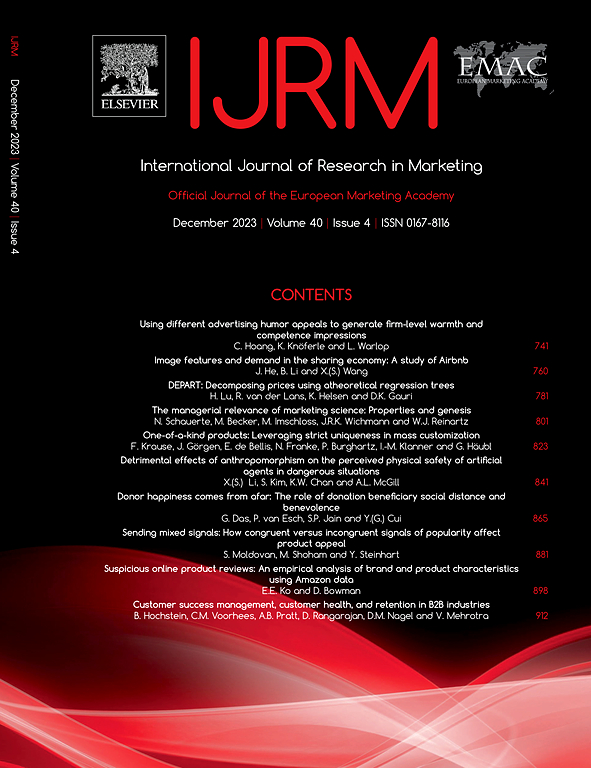关于谷歌和Facebook A/B测试的持续错误描述:如何进行和报告在线平台研究
IF 7.5
2区 管理学
Q1 BUSINESS
International Journal of Research in Marketing
Pub Date : 2025-09-01
DOI:10.1016/j.ijresmar.2024.12.004
引用次数: 0
摘要
营销研究越来越依赖于在线平台研究,这些研究是在自然的在线环境中进行的,利用Facebook或b谷歌广告等平台提供的a /B测试工具。这些研究允许研究人员比较不同广告的有效性及其传递方式,并研究“真实”的消费者行为,如点击广告。然而,他们缺乏真正的随机分配给消费者的广告,防止因果推理。在本文中,我们对133项已发表的在线平台研究进行了全面回顾,揭示了研究人员迄今为止如何利用和描述这些研究;我们发现,这些研究中的大多数都被错误地描述为(随机)实验,他们的大多数发现都被错误地描述为因果关系。我们的回顾表明,对在线平台研究固有的混淆性的认识有限(即,无法将用户的反应归因于广告创意与平台的目标算法)。重要的是,随着时间的推移,这些不受欢迎的做法的流行一直保持相对稳定。在此背景下,我们为对该方法感兴趣的研究人员和受邀评估该方法的审稿人提供了关于如何定位、进行和报告在线平台研究的明确指导。本文章由计算机程序翻译,如有差异,请以英文原文为准。
On the persistent mischaracterization of Google and Facebook A/B tests: How to conduct and report online platform studies
Marketing research has increasingly relied on online platform studies, which are studies conducted in a naturalistic online environment and which leverage the A/B testing tool provided by platforms such as Facebook or Google Ads. These studies allow researchers to compare the effectiveness of different ads and the way they are delivered, and to study “real” consumer behavior, such as clicking on ads. However, they lack true random assignment of ads to consumers, preventing causal inference. In this manuscript, we present a comprehensive review of 133 published online platform studies revealing how researchers have, so far, utilized and characterized these studies; we find that most of these studies are mistakenly presented as (randomized) experiments and most of their findings are erroneously described as causal. Our review suggests limited awareness of the inherent confoundedness of online platform studies (i.e., the inability to attribute user responses to ad creatives versus the platform’s targeting algorithms). Importantly, the prevalence of these undesirable practices has remained relatively constant over time. Against this backdrop, we offer clear guidance on how to position, conduct, and report online platform studies for researchers interested in this method and for reviewers invited to evaluate it.
求助全文
通过发布文献求助,成功后即可免费获取论文全文。
去求助
来源期刊
CiteScore
11.80
自引率
4.30%
发文量
77
审稿时长
66 days
期刊介绍:
The International Journal of Research in Marketing is an international, double-blind peer-reviewed journal for marketing academics and practitioners. Building on a great tradition of global marketing scholarship, IJRM aims to contribute substantially to the field of marketing research by providing a high-quality medium for the dissemination of new marketing knowledge and methods. Among IJRM targeted audience are marketing scholars, practitioners (e.g., marketing research and consulting professionals) and other interested groups and individuals.

 求助内容:
求助内容: 应助结果提醒方式:
应助结果提醒方式:


